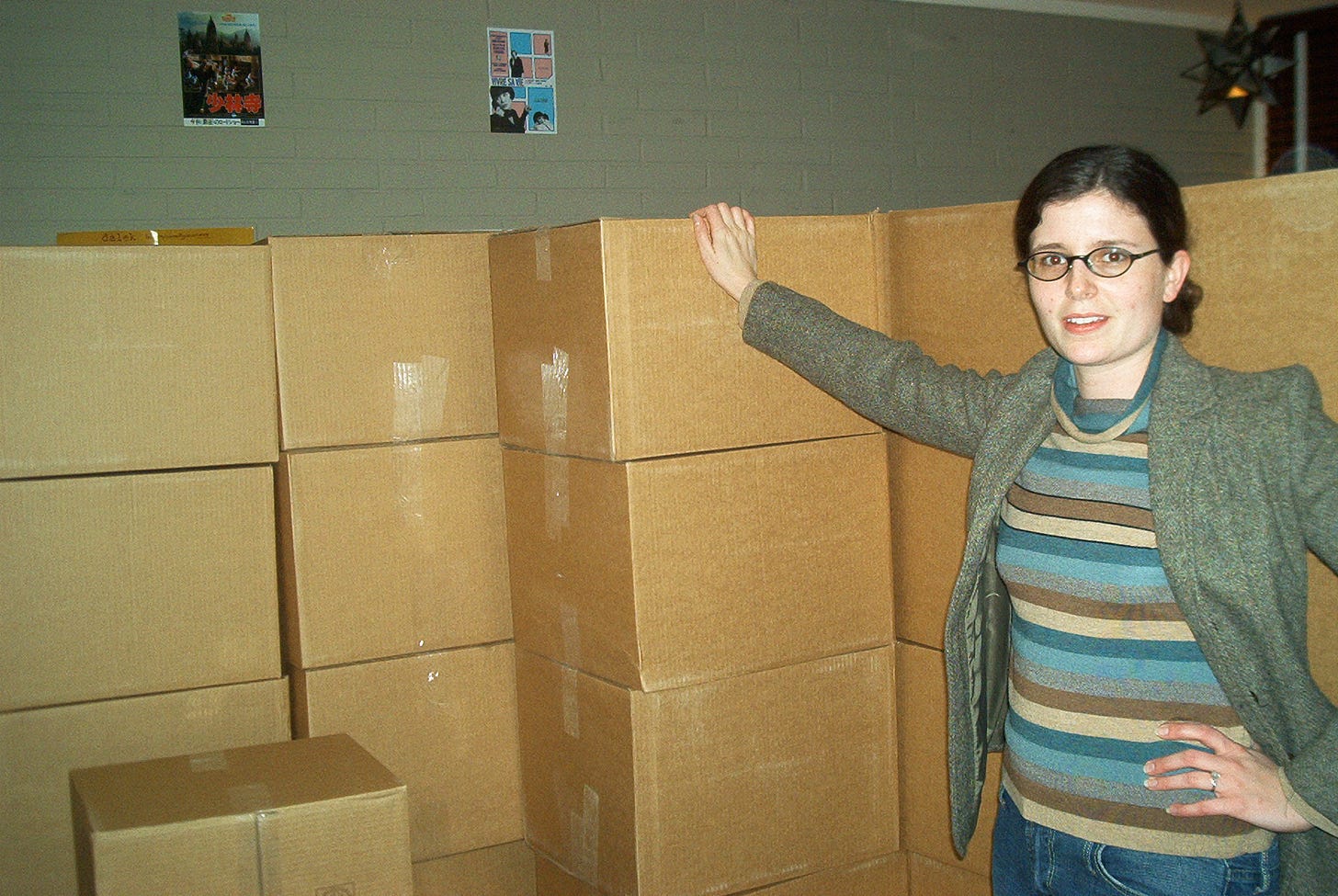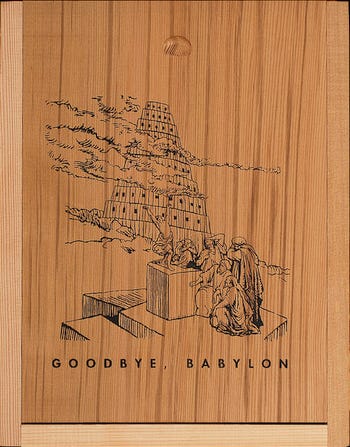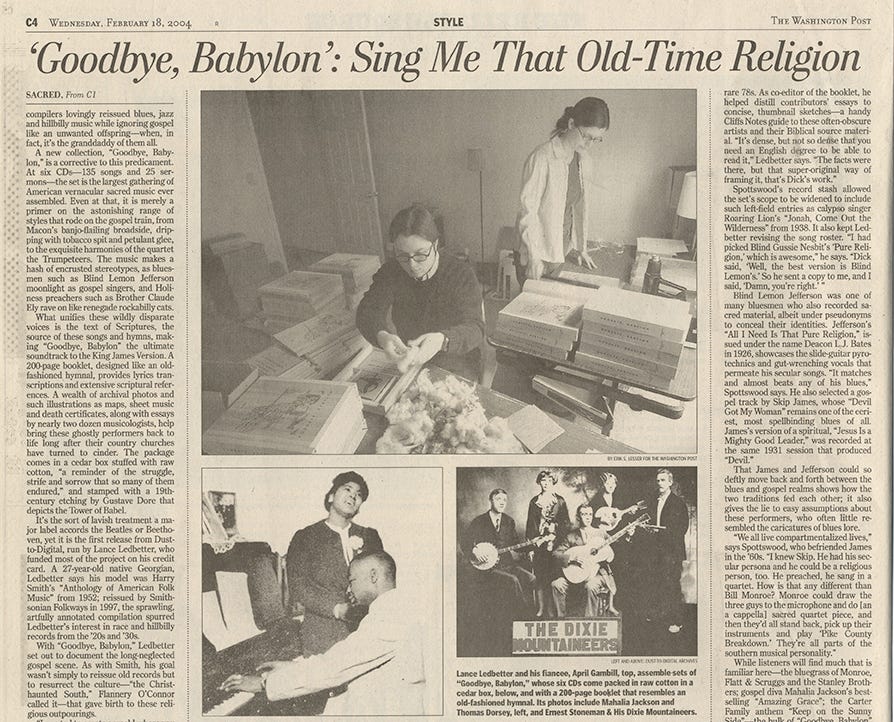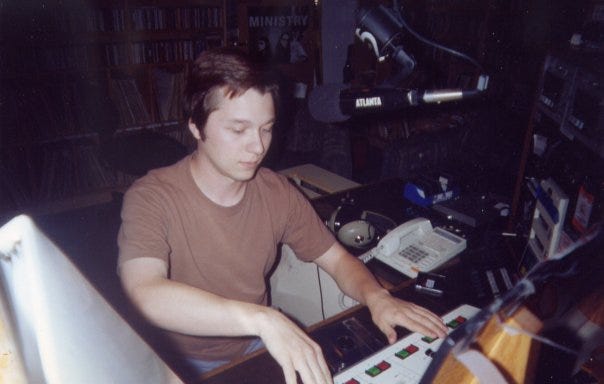The 20th Anniversary of Dust-to-Digital
Two decades of sharing music and inspiration with a look back at the release that started it all.
This month marks two decades since the publication of our first release, “Goodbye, Babylon.” More than four years in the making, the box set changed our lives almost immediately when it was launched in late 2003. Due to the unanticipated level of excitement about the release, our days quickly became a busy swirl of assembling box sets. The tasks included receiving shipments, collating CDs, assembling the sets and shrink wrapping… each and every one.
From 2003 until 2019, we and a team of friends, family, and interns hand-assembled the box set, approximately 20,000 physical copies. Then, in 2019, we decided to put down the shrinkwrap gun and let the physical edition go out of print. (The digital edition is still available via the Dust-to-Digital website and Bandcamp.) It wasn’t an easy decision as we had poured so much of ourselves into the project. It was what launched our label and helped to sustain our business for more than 15 years, and it will always hold a special place in our hearts.
A recent search through the label archives turned up quite a few items that illustrate how much has changed over the last two decades in the way we interact with music. For example, the above feature from the Washington Post in 2004 states: “To hear a free Sound Bite from ‘Goodbye, Babylon,’ call Post-Haste at 202-334-9000 and press 8165.” Does anything like that still exist?!?
In fact, so much has changed that we (April and Lance Ledbetter, the founders and proprietors of Dust-to-Digital) recently sat down to talk with each other about this special occasion.
Lance asked April…
What drew you to the work early on in the label’s history?
I’ve always been interested in culture and understanding people. I think when you first started talking with me about the music that would become “Goodbye, Babylon,” I found it very intriguing -- it was something regionally close to me that I was unfamiliar with. As a naturally curious and musically minded person I followed the path to understand and learn about the lives of people from the recordings we were listening to.
What kept you involved? Was the work rewarding?
I think what kept me involved was this real and immediate need for help and support for the label. The process of releasing “Goodbye, Babylon” involved a tremendous amount of work in terms of physically assembling each set, boxing them up and mailing them to distributors and customers. There were also so many logistics to figure out in terms of running a record label. It really wasn’t something that Lance could’ve done on his own and I felt compelled to continue being a part of the process of making it happen.
The work has been very rewarding. I find a lot of satisfaction in knowing that we’re part of creating access to amazing music that would be incredibly hard for people to source. That’s changed a lot over the years. I think it’s easier to find recordings now, but I also think it’s more challenging because of the volume of content that most people are presented with on a daily basis.

How has Dust-to-Digital changed over the years?
The biggest change has been the development of our social media, its presence and impact. We had this revelation years ago that people weren’t really interested in reading reviews of new releases or whatever else we were posting at the time. Social media audiences were looking for entertainment, something immediate. Lance began posting these amazing performances that we had personally enjoyed and shared privately with friends for years. It felt like a revelation, much like “Goodbye, Babylon," because we released ourselves from the limitation of staying within what others might have defined as Dust-to-Digital’s genres. It was powerful to be free of limiting definitions and instead to be tuned into the feel, joy and wonder of music.
April asked Lance…
Lance, why did you start working on “Goodbye, Babylon?”
I knew from around the age of 14 that I wanted to start a record label. I moved to Atlanta to attend college and through my internship at the experimental music and archival record label Table of the Elements and DJing at the college radio station WRAS, I developed an understanding that a record label could operate without releasing new music. That freed my mind, and I sort of locked in on early gospel recordings because I found them to be very moving and I always had a difficult time finding those in record stores.
What is this connection you have to music? It seems like you were inspired at a young age.
I believe that my interest started when I was very little watching television shows like Sesame Street and Mr. Rogers. From the age of probably three or four, I just was always drawn to music. And as I got older and began listening to a greater variety of styles, I learned that I was pretty good at deciphering what good music was. I know that is a subjective quality, but I think I had the confidence to firmly stand behind what I believed in. Over time, I would share music with friends, and I found it rewarding to see their faces light up when they heard something that really moved them. I believe those types of interactions became the foundation to what drove me to continue to find music to share with people in hopes of enriching their lives.
Do you think the music of “Goodbye, Babylon” is still relevant?
I believe that the recordings that were included on “Goodbye, Babylon” are still very relevant, but I believe the methods which people now use to access music has changed so drastically since the release that I don’t know if the set is made for these times. The compilation featured 160 tracks, and it was accompanied by a 200 page book. I believe in 2023 an audio release of that nature does not line up with the way that most people listen. Not to sound pessimistic, but we live in an era of playlists that almost always omits liner notes. In 2003, the landscape of how people listene to recorded music was very different than it is today.
For example, check out this Sister Rosetta Tharpe post we made last month. It features “Strange Things Happening Every Day” a song we included on “Goodbye, Babylon.” Our box set sold 20,000 copies, but this one post was viewed 2.2 million times and received 180,000 likes. Our goal has always been to turn people on to great music, and as you can see by the response to people viewing, liking, and sharing the Sister Rosetta Tharpe post, she is still very relevant in 2023.
Another even more recent example of the change in how people find music is the André 3000 Digs Jazz playlist on Spotify. Fellow Atlantan André Benjamin, one-half of the hip-hop duo OutKast, recently surprised many people when he came out of an extended recording hiatus to release not a hip-hop album as many would presume but one of flute music that fits more in the ambient music or spiritual jazz genres. Along with his new recordings, he published a playlist to showcase the music that influenced the making of his new album. Of the 40 songs that André included, three are from albums and box sets produced by Dust-to-Digital:
Kassidat: Raw 45s from Morocco
Qat, Coffee & Qambus: Raw 45s from Yemen
Music of Morocco: Recorded by Paul Bowles, 1959
Again, we see the process of reaching listeners has changed so much from when we started. Streaming, playlists made by both individuals and mainstream artists alike, and social media platforms like Instagram did not yet exist 20 years ago when “Goodbye, Babylon” was released. The landscape is different, and we have had to adapt to meet listeners where they currently are.
What do you see for the future of Dust-to-Digital?
It’s my belief that the future of Dust-to-Digital will be a continuation of our mission to share recordings from around the world and throughout time. I feel fortunate that our social media accounts, especially Instagram, have become a hub for people to share performances and knowledge and to hear a variety of musical forms and learn about other cultures. Like Sun Ra said, music is a language that speaks all of the things which are inexpressible in and by words. To me, the community that we have built is like a dream come true because April and I are just two people, and it is very helpful to have so many keen listeners who have found us and understand our vision. My hope is that Dust-to-Digital will be helping people find music that moves them for the next 20 years and beyond.
“Since its first release in 2003, the tiny company run from their modest brick house in a quiet Atlanta neighborhood has become a powerhouse in the niche market of music that’s been gathering dust, waiting to find or regain an audience...”
—Don Schanche Jr., Associated Press
As mentioned above, the physical edition of “Goodbye, Babylon” is no longer in print. However, the digital edition with 160 tracks and a 200-page PDF are available via the Dust-to-Digital website and Bandcamp. Additionally, we have a few copies of the printed book as well as some of the promotional sampler CDs we produced ahead of the release. We created a special bundle of those items, they can be found on the Dust-to-Digital website.
Here’s one of the few Jazz tunes on the set that we want to share with all of our Substack subscribers.

Last but certainly not least, in gratitude to our paid subscribers and their support we have created a mix featuring some of our favorite cuts. Thank you and we hope you will enjoy the selections!










